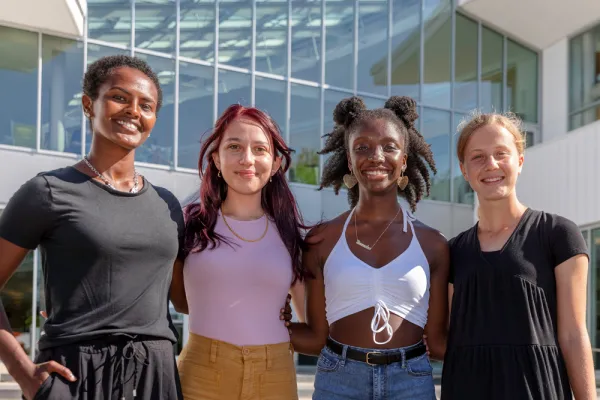Shaping Change at Smith: Meet the Advocacy for Equity Council
Campus Life
Published August 27, 2021
In fall 2020, Leela de Paula ’23 had an idea she hoped would take student activism on campus to a new level.
She was serving her first term as a member of Smith’s Student Government Association during a pandemic semester that posed major challenges for students—particularly those with limited resources.
“A lot of students had no income during that summer because everything was closed down” due to the coronavirus pandemic, says de Paula. “I realized there wasn’t a working group in SGA that was addressing issues facing low-income and marginalized students. So, I proposed a committee.”
Since then, the Advocacy for Equity Council has been a catalyst for student organizing around social justice issues at Smith. From pressing for increased assistance for undocumented students, to finding ways to make existing college resources more accessible, the committee aims to be “that grassroots connection for students who may see a problem and want to make a change, but don’t know how,” says group co-chair Zufan Bazzano ’22.
The membership of the council is now open to all students—not just those in SGA. Council leaders are excited about engaging fellow Smithies this fall in identifying issues and collaborating with other student organizations to address needs on campus.
Here’s what de Paula, Bazzano and fellow council members Sena Amuzu ’24 and Aerin McQuillen ’24 had to say about the group’s efforts:
How is the work of the Advocacy for Equity Council different from previous student organizing at Smith?
Leela de Paula: “One of our main intentions in being an SGA committee is that we have access to resources and to the administration. That makes it an effective platform for doing good. Students are only [at Smith] for four years, and it seems sometimes like an inconsequential amount of time to make lasting change. We want to have a place where students are not only the beneficiaries of a change, but are the ones at the table shaping the policies and the culture.”
Sena Amuzu: “I think one thing our committee is really great at is trying not to create such an exclusive space. We’re very collaborative. We really do want to work together and depend on each other and have this fluidity. One way we do that is to delve into the areas where people are already active. Leela and I are both on the Inclusion Council, and that gives us an in, in that way.”
What are some of the issues the group has worked on up to now?
Zufan Bazzano: “Early on we settled on three campaigns. The first was expanding the undocumented students’ fund and making financial aid easier and more understandable for students. The second was a basic needs campaign—creating a resource document that we could hand out to students. Smith provides a lot of resources and funds, but they are scattered in different web pages. We wanted to make that more accessible. And then there was a student outreach campaign to increase transparency about campus-wide initiatives.”
What drew you to want to get involved with the council?
Aerin McQuillen: “I wasn’t a member of the SGA; I joined because one of my soccer teammates shared the [committee’s] link and it seemed like a group that was trying to make the campus a more equitable space. I wanted to learn more about what’s going on on campus and affecting change in the lives of students. Not being in SGA, I can attest that the council is very open and inclusive. I would encourage everyone to join!”
Bazzano: “I joined this committee as a rising junior. Before that, I was always hesitant about stepping into the realm of talking to the administration or saying what I wanted from the administration. When I joined SGA last fall, it eased that anxiety about asking for what you need—knowing you can actually have a conversation with those making the decisions.”
What will you be working on this fall?
de Paula: “We’re going to be focusing on resources, making sure all of the student funds are fully funded and addressing equity issues as they arise. We also want to have conversations with the administration about making [admission to] Smith need-blind. We want to support that and make sure students get involved.”
McQuillen: “We’ve also had several meetings to plan how we’re going to transition to an on-campus space from being remote. We’re excited about being able to hold some events and be an in-person space where people can bring their grievances.”
Bazzano: “We were created when we were remote, so we had to be creative about how to reach students. A lot was through social media. I think the pandemic had a huge effect, but also created an opportunity for students to stand up and advocate for themselves.”
Amuzu: “Yes, being away from campus so long makes people feel detached from the norm. So, when we go back, we can see an opportunity: Do we go back to the status quo, or do we push for more? That’s something you don’t always get to do.”
What do you hope will be the impact of the council’s work?
de Paula: “Everyone on this committee is so dedicated and passionate. They are advocating for others and also for themselves. It’s such a unique and effective collaboration. And I hope we keep expanding our team and our influence as the years go on.”
Amuzu: “We know that students are sometimes drawn away from getting involved because they can’t give that much time. We want to serve as a catalyst, making sure people know what is happening. Each small step matters. If I can make someone’s experience here better than mine, that’s huge in my eyes.”
Advocacy for Equity Council members who posed for a photo on the first day of classes are (from left): Zufan Bazzano '22, Leela de Paula '23, Sena Amuzu '24 and Aerin McQuillen '24.
